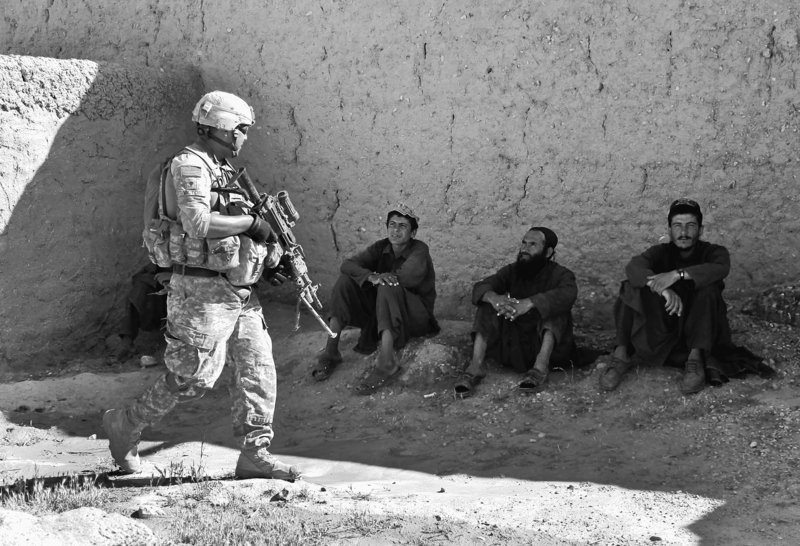CHAMKANI, AFGHANISTAN – I think I had a small victory the other day. I was on my way to visit the construction site for a new Afghan Border Police Headquarters near Chamkani when my mounted patrol encountered a group of young males near a local school throwing rocks.
I would guess they were between the ages of 6 and 12. When I say they were throwing rocks, I mean future Red Sox pitching prospects, and at least 50 of them. They cracked a ballistic window on one of my vehicles.
Now, I am by no means a professional baseball scout, but in my opinion they threw much too hard to be future Yankees. The same instant I decided to stop I had also decided one other thing — I was going to make these kids not hate me, or I’d die trying. (When you say things like that while deployed in Afghanistan, it’s not just rhetoric.)
On our way back to my combat outpost, the kids were no longer at recess and were back inside the walled compound that housed the school. I went to the gate and asked for the headmaster.
INSIDE THE SCHOOL
He immediately came out to meet me and invited me inside. I dropped my body armor and helmet before entering and wrestled for a split second with the thought of not taking my weapon. After a quick reality check I realized that the Afghan version of Pedro Martinez could very possibly be on the other side of this wall, and that having M4 with me was prudent, although I must admit I still felt outgunned.
The meeting inside went very well, better than expected even.
I learned the school’s headmaster, Hakeem Gul, spoke decent English and was very thankful to America. Americans had helped build the school and Gul still keeps in contact with one of the Americans he worked with on the project, talking to him fairly regularly. When we sat down in his office, I saw sincere embarrassment on his face, and a trace of shame and felt no need to embarrass him any further.
His hands shook when he spoke, a result of old age I suspect, and quite possibly they shook a bit more from the uneasiness of the situation. My intention was not to make him uncomfortable nor intimidate him. I wasn’t mad — all I really wanted was to get his schoolchildren to stop throwing rocks at my soldiers.
I also wanted to get a better understanding of why they were throwing rocks in the first place. Were they just boys being boys, or did they hate us? I left the school 95 percent convinced that the kids did not hate us, and feeling pretty good about the whole situation. (You always have to leave a 5 percent fudge factor; it is Afghanistan after all.)
Before leaving, Gul and I stood at the gate for several more minutes and I shook and then held his hand as he continued to apologize. Before I left he gave me a big hug like we were long lost friends and then we were on our separate ways, but fully expecting to meet again.
Why did I tell you this rather insignificant story from Afghanistan? Because nothing is insignificant in Afghanistan.
Word spreads faster here than Twitter gossip at a high school campus back in the States. It is not insignificant because now I have an inroad with a school in my area of responsibility. If Gul’s school kids stop throwing rocks, I can now start engaging them, set up arrangements to help with school supplies and deliver much coveted ink pens.
This one little episode may prove itself a small victory, but only time will tell.
STARTING SOMEWHERE
For the time being the outcome so far feels pretty good and I embrace the potentially small victory. I have been here for just over a month now and I have come to the conclusion large victories are not the key to success here.
Small victories matter here. Unfortunately so do small defeats.
The large victories in Afghanistan come from a series of small victories strung together.
Don’t let the “feel good” nature of this letter mislead you. Winning in Afghanistan involves killing, capturing or reintegrating Taliban. Expelling and killing foreign fighters are also very real parts of the solution.
Take me at my word, as an infantry company commander, I and my men are eager to do it. However, those types of operations are “shaping operations,” as we say in the military.
The decisive operation, I am convinced more each day, involves the people, especially the kids. If we can convince them that we are truly here to help, then we win. If not, we lose.
That simple. That hard. It’s no small feat, but you have to start somewhere. Why not with a small victory at a school in Chamkani?
Send questions/comments to the editors.



Success. Please wait for the page to reload. If the page does not reload within 5 seconds, please refresh the page.
Enter your email and password to access comments.
Hi, to comment on stories you must . This profile is in addition to your subscription and website login.
Already have a commenting profile? .
Invalid username/password.
Please check your email to confirm and complete your registration.
Only subscribers are eligible to post comments. Please subscribe or login first for digital access. Here’s why.
Use the form below to reset your password. When you've submitted your account email, we will send an email with a reset code.